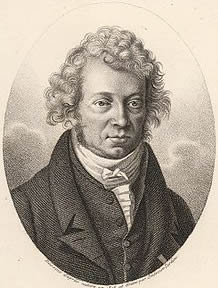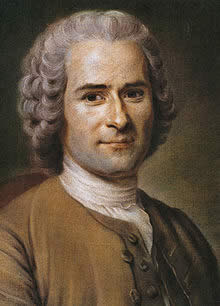Uncertainty is the greatest torture that a man suffers on earth
 André-Marie Ampère
André-Marie Ampère
Ampère’s father was called into public service during the French Revolution by the new revolutionary government, becoming a justice of the peace in a small town near Lyon. When the Jacobin faction seized control of the Revolutionary government in 1792, his father Jean-Jacques Ampère resisted the new political tides, and he was guillotined on 24 November 1793, as part of the Jacobin purges of the period. The death of his father by cruel behading was a great shock to the delicate, sensitive boy, who for more than a year was in a state bordering on idiocy.
In 1796 Ampère met Julie Carron, and in 1799 they were married. His marriage to the pious Julie Carron was secretly performed by a priest, her family refusing to recognize the competency of the "constitutional" clergyman; this fact impressed him very deeply. André-Marie Ampère took his first regular job in 1799 as a mathematics teacher, which gave him the financial security to marry Carron and father his first child, Jean-Jacques (named after his father), the next year. In 1802 Ampère was appointed a professor of physics and chemistry at the École Centrale in Bourg in eastern France, leaving his ailing wife and infant son in Lyon.
Unfortunately, his wife died in July 1803. On the day of his wife's death he wrote two verses from the Psalms, and the prayer, 'O Lord, God of Mercy, unite me in Heaven with those whom you have permitted me to love on earth.' Serious doubts harassed him at times, and made him very unhappy. Then he would take refuge in the reading of the Bible and the writngs of Christian Theologians.
."Doubt" (uncertainity ?), he says in a letter to a friend, "is the greatest torture that a man suffers on earth".
 Rousseau in 1753
Rousseau in 1753
Education direct from Nature
Jean-Jacques Ampere, the father of Ampere was a successful merchant and an admirer of the philosophy of Rousseau. Rousseau's theories of education were the basis of Ampère’s education. Rousseau believed that young boys should avoid formal schooling and pursue instead an “education direct from nature.” Ampère’s father actualized this ideal by allowing his son to educate himself within the walls of his well-stocked library. Ampère used his access to the latest mathematical books to begin teaching himself advanced mathematics at age 12. In later life Ampère claimed that he knew as much about mathematics and science when he was eighteen as ever he knew. His reading embraced history, travels, poetry, philosophy, and the natural sciences.